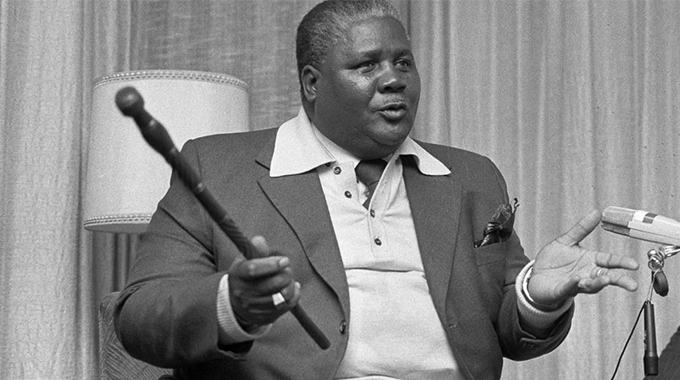
The Sunday News

Continued from last week
Again, in chapter eight William J Mpofu flows in the same path of revisionist interpretation as Nkomo is positioned under the various trials he encountered in the story of the liberation of Zimbabwe.
Above all, Nkomo is interpreted as a philosopher of liberation who envisioned peace and dialogue rather than violence in conflict resolution. Philosophers of liberation as described by Enrique Dussel (1985) are men and women of flesh, blood and bone whose intellectual and social sensitivity, love for life and freedom compel them to rebel against domination of any form.
The vocation of the philosophers of liberation is not only to humanise and liberate the dehumanised victims of oppression such as colonised peoples, but it is also to humanise and liberate the oppressors such as the colonisers who are entangled in the inhuman condition of being racist haters and exploiters (p. 194). By doing so, Mpofu argues, Nkomo defeated the colonial government and “Machiavellian tactics” to undermine and humiliate him.
Timothy Scarnecchia examines the role of Joshua Nkomo as a diplomat. Scarneccia argues that no much research has been carried out by historians on Nkomo focusing on his diplomatic roles except many studies prior his 1974 release from prison.
Beyond that, Morgan Ndlovu tackles the various representations on Nkomo using a socio-genetic analysis based on his political life as a product of a particular sociocultural background.
In addition to that, Rudo Gaidzanwa explores Nkomo’s struggles with colonial employment policies, entrepreneurship, ideas about land and land reform in independent Zimbabwe. Chapter 12 as enunciated by Everisto Benyera carters for the need to appropriate Nkomo’s role in transitional justice for full liberation in Zimbabwe. According to Benyera, Transitional Justice entails (2014: 336):
“At a different level, it is concerned with the choices, mechanisms, and the quality of justice implemented by states emerging from episodes of gross human rights abuses such as, civil wars and totalitarian rule, to respond to past oppression and injustice while constructing a new future based on democracy and the rule of law.”
As such, Joshua Nkomo is situated beyond binaries of “Father Zimbabwe” or “Father of Dissidents” and many other titles, tags.
The last section of the book, part three addresses issues co-authored by Ndlovu-Gatsheni and Busani Mpofu making a comparative analysis of Joshua Nkomo’s idea of Zimbabwe with Mandela’s idea of South Africa. Their political consciousness, and their conceptions of liberation mainly through a comparison of their autobiographies: Nkomo: The Story of my Life and Mandela’s Long Walk to Freedom, respectively.
The Chapter by Sylvester Dombo is an attempt to investigate how the memory of the liberation struggle icon is being appropriated supposedly for nation building.
Among other issues, Dombo also sought to draw from the press how the issue of honouring Nkomo was covered by the various newspapers in the country.
What kind of stance did the newspapers take and with what implications for their readership? Dombo paid attention specifically to the issue of the statues that were to be erected to honour Joshua Nkomo in Harare and Bulawayo.
The study is also situated within the discourses of contested pasts and contested memories. The theme of immortalisation is pursued by Henry Chiwaura.
The chapter achieves affirming that Nkomo’s immortalisation through several symbols and representations is not about the past as it is intend to shape current discourses within the society.
The well-documented conflict with Robert Mugabe soon after independence also has an impact on the way Nkomo is memorialised and immortalised in Zimbabwe. Nkomo appears in songs, books and academic articles. Buildings and schools are also named after him. Thabisani Ndlovu further delves into the topic of statues, particularly the one mounted in Bulawayo at the intersection of 8th Avenue and Main Street.
Drawing on heritage theories, particularly heritage interpretation, the chapter analyses government and counter-government narratives of Joshua Nkomo’s statue(s).
Notwithstanding the above, it’s notable that a number of spelling flaws frequent the passages of this long edited book project. For instance, the ZPRA ordnance and ZPRA ordnance was instead of “ordinance and was” respectively are not well written (p. 22).
The introductory chapter by Sabelo Ndlovu-Gatsheni was partly uninterestingly written, “The Chap. 3 and The Chap. 4 . . .” as if it was not appropriate to just write Chapter 3 then address the issues raised (p.37-38). There is also lack of spacing on “leadership of” on page 53, rather, it is written “leadershipof.”
All in all, the shortcomings found in the book are of less significance as Joshua Nkomo survives political toxicity in independent Zimbabwe. Perhaps, the very fact that he was not the President of independent Zimbabwe opened doors to the celebratory tone found in this seminal revisionist text. The spirit of Joshua Nkomo lives on 20 years after he passed on.
Writing Back to Zimbabwe
Joshua Nkomo: Politics, Power and Memory
Palgrave Macmillan
ISBN 978-3-319-60554-8 ISBN 978-3-319-60555-5 (eBook)
ν Brian Maregedze is an author, historian and columnist. He is also a Researcher Associate with Leaders for Africa Network (LAN), a Pan-African research think tank. Has membership with the Zimbabwe Historical Association (ZHA). For feedback email, [email protected]



